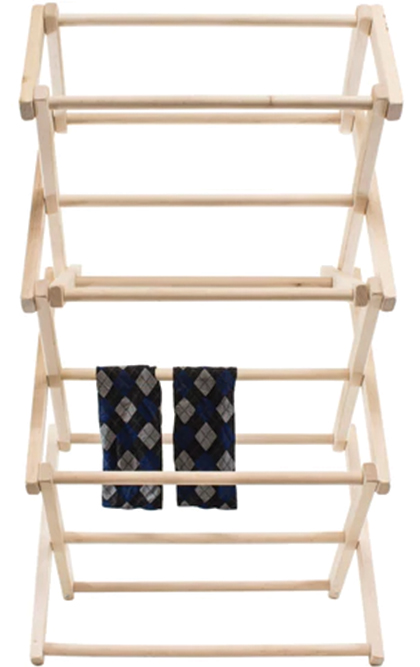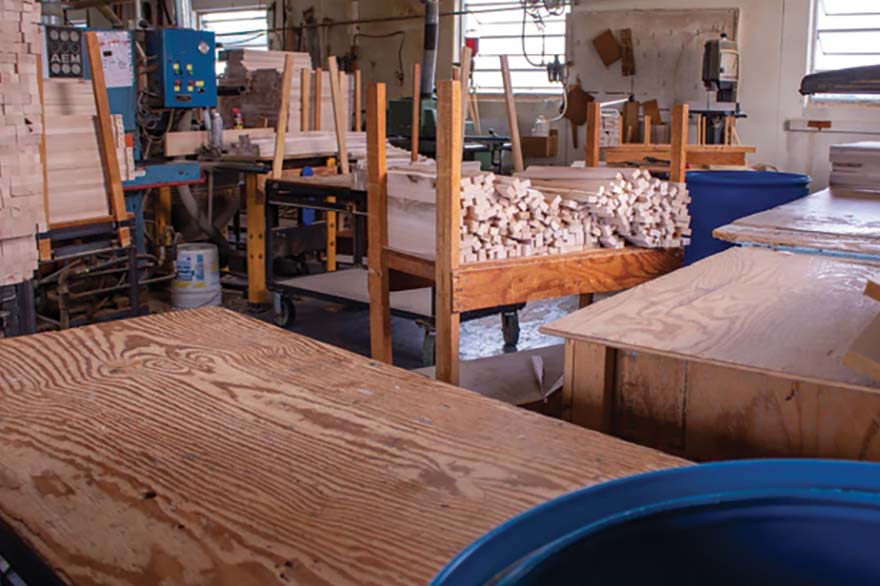A Family Business Thrives in a Niche Market
Red Hill Woodworks is located on a quiet country road in Narvon, PA. Inside the cinder block woodshop next to their home, Levi Beiler and his son Lloyd have been making wooden drying racks for many years. “My dad started this business in 1974,” Levi tells us. “He started down on the farm and was doing mostly custom work then. But he started making these drying racks when we were still on the farm. Finally, we had enough work just doing these.”

Red Hill’s sole business is making the drying racks. Besides Levi and Lloyd, “We have two employees, one full-time, and one part-time.” We make seven or eight thousand racks a year, and we ship them all over the USA.” Lloyd tells us.
The workshop has two levels. On the ground level, wooden stakes are turned into dowels. “This machine has an automatic feeder on,” explains Lloyd. “There’s a cutter on each side, and that puts the round shape on.”
Levi shows the carbide-tipped blades used in the dowel machine. “Some dowel machines have a cutter that go around the dowel, but this method makes it smoother and is a lot faster. It’s kind of like a molder,” explains Lloyd.
A conveyer belt helps move the wooden pieces through the machine, which has piles of sawdust underneath. Across the room, shelving holds neatly stacked dowels.
In the second story, there’s more equipment including a cut-off saw, a straight-line rip saw, several sanders, and a gang rip saw with five saw blades.
Levi shows us a machine that puts a notch in and drills a hole for a screw.
“The notch holds the dowels and acts as a brace to hold the clothes rack in place. The screw keeps the wood at the notch from splintering.”
Another machine “drills in the holes for the dowels, three at a time. It’s a specialty-made machine.”
Lloyd explains the steps for cutting the wooden pieces. “First, you run the boards through the planer. Then, you cut it to length and then take it over to the rip saw there where it puts a straight edge on. You have to cut a little bit of the edge to get a smooth edge. The last step is sanding the edges. We do that on the small drum sander.”
Most of the machines are highly customized. “They’re pretty simple. If you can build it, you can fix it,” says Lloyd.
Red Hill Woodworks uses only soft maple wood. “It’s not a building material,” Lloyd explains. “But some of the pallet shops are starting to use the furniture-grade wood because the price of building-grade lumber, like pine or hemlock, is sky-high. We might have to increase our prices, depending on what happens.”
The pieces are cut in the shop and the finished clothes racks are stored in a nearby shed. In between is the assembly process— but this step is done by others. “We have three people that do the assembly for us in their homes,” explains Lloyd. “We actually don’t do very much assembly ourselves.”
Lloyd estimates the total time to make a clothes rack from plank to finish is “a little less than an hour.”
Most of the clothes drying racks are the “floor standing racks” like we sell at Good’s Store. But the Red Hill also produces a “floor rack” with arms.

Levi tells us the story of what encouraged him to start making the new design. Some people had been telling him about the foldable floor racks, when “We went out to visit my daughter and son-in-law in Wayne County, Indiana. They had a neighbor, an older gentleman who was getting close to a hundred.
“He asked us, ‘What do you do for a living?’
“I said, ‘We make clothes drying racks.’
“‘You do?’ he said and then he told his son to go out in a certain shed, and a certain shelf, and get what’s out there on that shelf. The son returned with a drying rack and his father said “You got to start making them things. My wife used to use this.”
So that was what inspired the Beilers to start making the floor racks, first with 12 arms, and now with 16 arms.
When asked for advice on starting a small business, Lloyd says. “It’s a big commitment.”
Levi would advise working for a similar business. “Learn the trade first. Right now, I’d be willing for someone to come work with me for a while, and then maybe split the business. That’s the way I’d recommend for anyone to start up a business.”
After giving us a tour, the Beilers are ready to turn on their machines again and start working in the workshop with flowers growing beside it. It’s a hot summer day and a sweaty job, but the Red Hill Woodworkers have carved out their niche in the small business world of Lancaster County.
—Susan Burkholder

